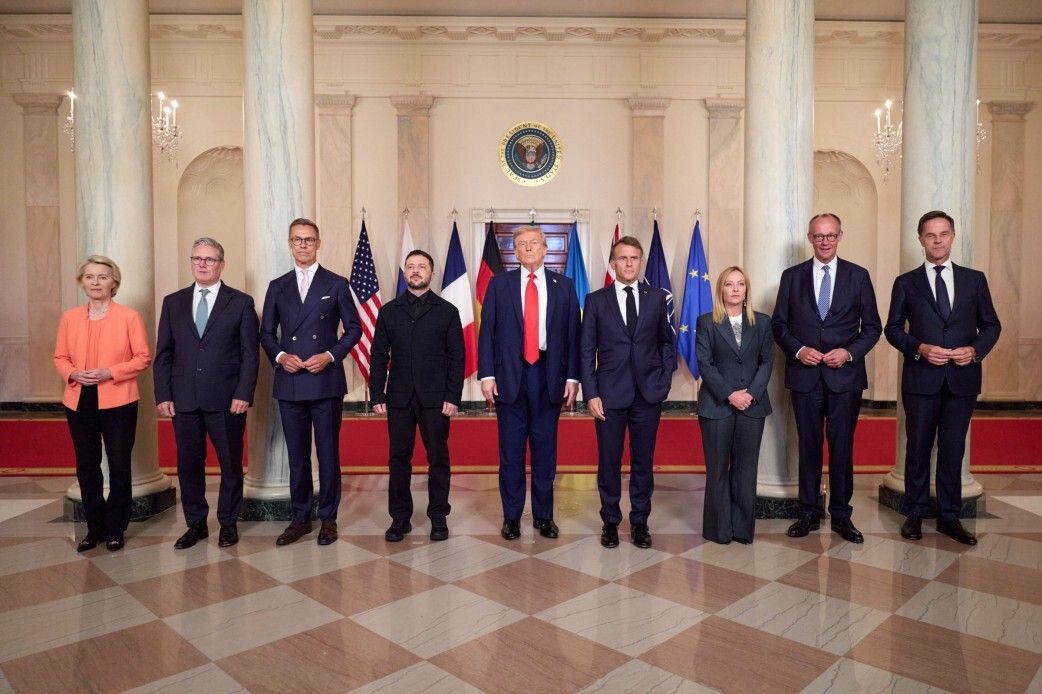 Photo: Ukrainian Presidency/Anadolu/Getty Images
Photo: Ukrainian Presidency/Anadolu/Getty Images
One of the hallmarks of Donald Trump’s second term as president (other than his frequent power grabs) is his peripatetic devotion to global problem-solving. He has, he wants us to know, ended “six wars in six months” (or more accurately, “none,” according to some critics). He aggressively intervened with military force in the Israel-Iran conflict and offered a classically Trumpian “solution” for the most intractable quagmire by sharing his vision of Gaza as a luxury resort ridden of its current population. He’s even referred to himself and Bibi Netanyahu as “war heroes” for their common exploits this year.
Trump has also become very involved personally in trying to broker some sort of deal, cease-fire, or surrender to end the terrible Russian war on Ukraine. In just the last few days, he’s jetted off to Alaska to meet with Vladimir Putin, then jetted back to Washington to host Volodymyr Zelenskyy and a large group of leaders of the countries more unambiguously committed to the support of Zelenskyy.
Even if you don’t count Trump’s tariff diplomacy as a sign of creeping globalism, he’s sure spending a lot of time on international relations for an apostle of an “America First” foreign policy. And there are regular signs that his approach to world affairs has confused his MAGA following, with OG Trump adviser Stephen Bannon signaling widespread fears that the 47th president is in danger of alienating his base with too much attention to developments beyond our borders.
The Boston Globe’s James Pindell goes so far as to say that Trump has abandoned “America First” altogether:
Trump has been clear about what motivates him: he wants a Nobel Peace Prize. He has not only said as much publicly but reportedly made a call lobbying for it privately.
The problem, of course, is that none of those conflicts were inherently about America or American interests. Which begs the question: what happened to being “America First”?
The answer is that it is essentially dead. The doctrine has become yet another casualty of Trump’s ever-shifting impulses, often changing with the last conversation he had or the latest shiny object to catch his attention.
To be clear, even after Trump salvaged the “America First” slogan from its association with a particular brand of Nazi-friendly pre–World War II isolationism, it has never been what you might call a foreign-policy blueprint. Every president claims to make American interests the driving motivation of U.S. foreign policies. Some have chosen to promote those interests through the system of alliances, international institutions, and universal norms Trump has worked to undermine, if not destroy. But nobody takes office wanting to engage in “forever wars” or to subordinate national to international aspirations. And Trump’s own love for big defense budgets, military parades, and the overt flexing of U.S. power has always made him an unlikely tribune for a deescalation of global conflicts so that America can focus on its own problems.
But the real problem with the notion of Trump ushering in a new era of “America First” foreign policy is the incredible extent to which he identifies his country’s interests and resources with himself. During his four years out of power, every time he attacked a Biden administration international policy, his invariable alternative was Donald Trump as a world-historical force. Had he still been president, he said again and again, Russia would not have invaded Ukraine, Hamas would not have attacked Israel, and China would have stopped its drive for global hegemony. Trump’s unique strength has from the beginning been the central theme of the “America First” critique of all the other 21st-century presidents. As he so often said during all three of his presidential campaigns, only he could “save America.” So it’s not surprising his limitless self-estimation would extend to international relations, which is indeed a huge part of any president’s portfolio.
The problem with this approach isn’t just that Trump has been regularly tempted out of his comfort zone in domestic politics and government and into dangerous flirtations with un-American leaders. It’s that it’s hard to envision a post-Trump “America First” foreign policy that could survive without his matchless personal touch.
For his MAGA movement, it’s an important example of a more general problem. As Trump’s heir apparent, Vice-President J.D. Vance isn’t just auditioning to become the next Republican presidential aspirant. He’s auditioning to assume the central role in a cult of personality. And Trump himself may struggle to admit the possibility that anyone can embody America the way he does. In the meantime, he wants to make his legacy as a national and global leader as massive as his ego.
More on Politics
Did Epstein Really Introduce Donald Trump & Melania? A Deep Dive.FBI Gets New Deputy Director, Though Bongino Hasn’t QuitMore High-Crime States Send National Guard to Tame Washington
From Intelligencer - Daily News, Politics, Business, and Tech via this RSS feed

